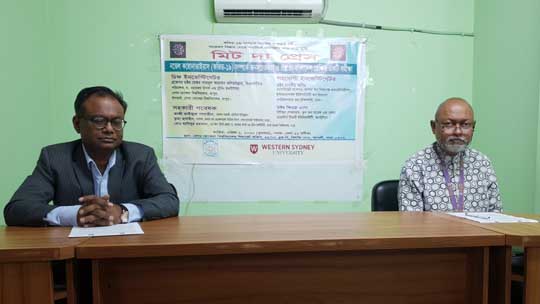
Through public knowledge, daily hand washing, home quarantine, and ongoing lockdown, corona can be prevented. The findings have come out from a joint study conducted by the Dr Wazed Research and Training Institute, Begum Rokeya University, Rangpur (BRUR) and the University of Western Sydney, Australia.
Survey Chief Investigator and Vice-Chancellor of the BRUR, Prof Dr Major Nazmul Ahsan Kalimullah, BNCCO made this dissemination of information during a press conference held at the Dhaka Liasion Office of BRUR on Wednesday.
Dr Tanvir Abir, Associate Professor of International University of Business Agriculture and Technology was present as Associate Investigator at Meet the Press event. Among others, Taha Husain, Lecturer of Gender and Development Studies Department, BRUR was present as an Associate Researcher there. The Chief Investigator stated in his speech that the novel coronavirus infection has plagued the entire world today. The main aim of this study in the context of Bangladesh was to raise the awareness and understanding of COVID-19 among Bangladesh’s mass populations. The research has conducted a cross-sectional survey using the Convenient Sampling method, using an online forum (Social Media), administered by the School of Science, University of Western Sydney, Australia, and Dr Wazed Research and Training Institute, BRUR.
The platform’s pool of participants numbers were approximately 385 individuals, of whom 322 are chosen after the incomplete responses were eliminated. The respondent was chosen to have approximately the same distribution of age, sex, and ethnicity (and each combination thereof) as the Bangladesh general population.
The chief investigator delivered that out of 322 respondents, 50.6% were males. 59.3% lied in the age bracket of 18 to 28 and 47.2% were completed Bachelor’s Degree or equivalent. 37.9% of respondents were involved in full-time employment followed by 29.2% in were unemployed, 19.9% were currently not working due to voluntary reasons (e.g. due to parental leave or retirement) and 13% worked part-time. Additionally, overall, 61.2% of respondents lived with their parents, followed by 40.4% were with their spouse/partner, 38.8% were lived with their siblings. 88.2% of the respondents were Muslim with their religious beliefs. 58.4% of the participants’ viewed that they had a strong belief about their religion and 51.2% participants said their own religious belief give them strength and confidence.
Most of the respondents (99.3%) said they were aware of the Coronavirus disease (COVID-19) outbreak. The majority (n = 322) of the research participants (41.9%) acquired knowledge about COVID-19 from Posts and videos on social media like Facebook & Twitter followed by 28.6% were gathered knowledge from newspaper and television and 21.7% from official websites of WHO & CDC (Centre for Disease Control). Among the knowledgeable participants (n = 322), the majority think that (94.7%) Coronavirus disease (COVID-19) outbreak is dangerous.
Almost half (53.9 %) think that Public Health Authorities in Bangladesh are doing enough to control the Coronavirus disease (COVID-19) outbreak. 41% respondent said they get clarified answers about the Coronavirus disease (COVID-19) outbreak. 85.1% of respondents think hand hygiene / hand cleaning is important to control the spread of the Coronavirus disease (COVID-19) outbreak. When participants were asked about wearing masks is important to control the spread of the Coronavirus disease (COVID-19) outbreak, responses varied from yes 68%, No 5.3%, and Maybe to an extent 26.7%. 46.6% think, the N95 mask is working better to control the spread of the coronavirus. More than half of the participants felt that antibiotics cannot be effective in preventing Coronavirus disease (COVID-19) outbreak (54%). Also, 60.6% said there were not any specific medicines to treat Coronavirus disease (COVID-19).
As many as 43.8% said that there were not diagnosed any case for COVID-19 from their surrounding environment. But most of the respondents (48.8%) believed that their immediate environment is at risk of infection with COVID-19. Additionally, they think they were not at increased personal risk of infection with COVID-19.
Dr Abir added that all participants were asked COVID-19 related questions, irrespective of their knowledge about COVID-19, to explore their perception about COVID-19 (Table 3). ‘We asked the respondent about their risk of infection with COVID-19 with some subhead, the participants said they had low risk to becoming infected (35.1%), 39.8% said they had very low of chances becoming severely infected, and 46% of the respondent said they had a very low risk of dying from the infection’. Bur most of them (69.9%) worried because of COVID-19. Most of them (57.5 %) were in (domestic/home) quarantine because of COVID-19 during the study time. Although respondents were asked about their home quarantine feeling under some subhead. 26.4% strongly agreed that they were worried and frightened by the quarantine, 57.8% strongly agreed the quarantine as necessary and reasonable, 26.1% agreed that they were nervous about the quarantine, 24.2% agreed that they were bored by the quarantine, 34.5% were strongly disagreed about their frustration by the quarantine time, and 49.4% strongly disagree that they were angry because of the quarantine.
The respondent on average spending 1-3 hours (36%) per day on the topics related to COVID-19 due to news coverage, work, conversations, thoughts, etc. for the last seven days.
We also asked some question-related media coverage of COVID-19 with some subhead. The respondent said that media played a responsible role to cover the COVID-19 (I feel well informed, agreed 38.2%), 33.5% had neutral on the issue of media coverage that spreading panic, also 32.6% were neutral on the issue that the coverage was controlled by the media and presented as same with other illnesses, again, 27% being neutral viewed that Information was being deliberately kept as secret, and finally, the respondents were keeping neutral (30.4%) as well as agree (30.4%) that they had access to neutral information about the virus. Additionally, 60.9% strongly agreed with restricting public actions and personal freedom to stop the spread of COVID-19 (e.g. the cancellation of public events like concerts or sports events).
Finally, there were some questions regarding the Government imitative for knowing the perception of the respondent. 53.1% thought that the government did not take the proper initiative to protect the outbreak of COVID-19. 55.9% thought that partially shut down of the local and international flights will control the outbreak of COVID-19. Again, 81.1% thought that the government will completely shut down the local and international flights immediately for the outbreak of COVID-19. 87.6% of the respondents thought that the government shut down the educational Institution at the right time. 93.8% of the respondent thought that the government should lock down the country immediately to stop the outbreak of the COVID-19. Also, they thought (95.3%) home quarantine is a good decision to stop the outbreak of the COVID-19. However, the respondent thought that (64.3%) the government has not enough capacity to stop the outbreak of the COVID-19. Also, 71.4% showed their negative impression on the statement “If COVID-19 outbreak, do you think the government can manage it”. However, 79.5% of the respondents thought that Bangladesh Army will be effective enough to manage quarantine and isolation facilities. Also, the respondent thought that the government is on the right track now to control the outbreak.
In his speech, Prof Kalimullah added that this study reveals that Bangladeshis are adequately aware of the novel coronavirus (COVID-19). There is, however, some forms of fear among people about the virus from which people may develop mental depression and stress which, along with their immune system, will, in the long run, affect their normal lives. We welcome some timely decisions taken by the government on behalf of the Dr Wazed Research and Training Institute, BRUR and hope that the measures taken by the government can continue until the outbreak of the virus is over. We also hope that it will be possible to rid Bangladesh of the outbreak of the Novel Coronavirus (Cavid-19) pandemic with concerted efforts by the mass population, the government and the other stakeholders concerned. Although current research was based on online, plans are to be conducted in the future in a wider range.
















